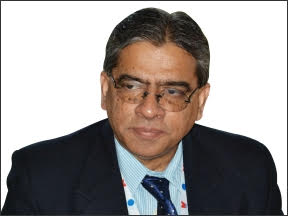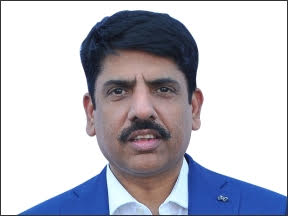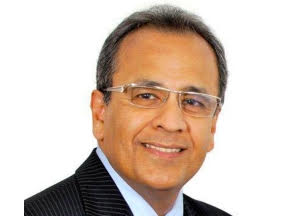“The standard story is that no industry is at 100 per cent levels; FMCG and pharma were the first ones who sprung up because of requirement irrespective of lockdown as they fall into the essential category. These verticals recovered but not to 100 per cent; they also had their struggles in terms of manufacturing or last-mile delivery. Chemical industry has also sprung back decently in May and June because chemicals are also required either in pharma or in FMCG. However, the auto industry is definitely a challenge for a little while and is not coming back so fast like other sectors. The entire chain in the auto is going to remain a challenge for a while whether it is a truck or car or two-wheeler. There will be a buying challenge at the consumer level. Probably, the sales of tractor and spare parts may not get impacted because of the agriculture and farm sector,” informed Aditya Shah, Executive Director, V-Trans India.
Read More »Stakeholders need to digitalise the existing systems for less manual intervention: V Raju
According to V Raju, Senior Vice President CL – Chemical, Pharma & Food Sector, Avvashya CCI Logistics (All Cargo Group), “COVID-19 has only created disruptions for us in the supply chain and logistics and we need to learn to live in an uncertain world. Today the warehousing and last-mile distribution occupies such an important part in the entire supply chain management. What is more important for all the stakeholders to think about it is how can they modernise and digitalise their existing systems such that the manual intervention becomes the least.” He expresses his views at CargoTalk’s fourth digital conclave. “Let us talk about the introduction of Warehouse Management System (WMS) in warehouses so that we can find out the exact location of cargo and also plan our receipts and delivery and inventory management in time with the help of these WMSs.”
Read More »Government initiatives on digitalisation & contactless movement are encouraging: Satish Lakkaraju
Keeping it simple in terms of what COVID-19 has done and what contactless means, Satish Lakkaraju, Chief Commercial Officer, Agility Logistics at CargoTalk’s fourth digital conclave says, “It’s clearly visible from the way we have been doing meetings in the past and how are we interacting now. It’s only operations that have still been on ground but the rest of the things are now contactless.” He continues, “It is highly encouraging to see government initiatives on digitalisation and contactless movement. In the past, our fear used to be that government is slow to react but for the first time customs is the least painful department to deal with as far as logistics is concerned.”
Read More »We have to be paperless first to go contactless: Cyrus Katgara
Calling contactless logistics a dream coming true, Cyrus Katgara, Partner, Jeena & Co and President, Air Cargo Forum India (ACFI), at CargoTalk’s fourth digital conclave says, “From last so many years we are asking to go paperless and adopt digitalisation but now is the time to go contactless. If we don’t do it now and will still rely on paper, sustaining in business for long would not be possible. Going paperless is the first step to go contactless; we have to be paperless to go contactless.” “Secondly, we definitely need to embrace technology like the way we have never done before,” he adds.
Read More »From the pages of CargoTalk: Why logistics cost in India is high: Sunil K. Vaswani
Talking about major factors which have led to an increase in the cost of logistics in the country, Sunil K. Vaswani, Executive Director, Container Shipping Lines Association (CSLA) India shares some of the spots where the shoe really pinches. He says, “While on the one hand, India aspires to be a US$ 5 trillion economy by 2024-25, on the other, its cost of logistics remains high at 14 per cent of the GDP, as compared to eight to nine per cent in the case of the developed economies of the world. The reasons for these are varied, some of which are commonly known while the others, although equally important if not more, are not generally talked about.”
Read More »o9 Solutions partners with Google Cloud to deliver supply chain solutions
In order to enable customers with supply chain solutions on Google Cloud, o9 Solutions has announced a strategic partnership with Google Cloud. The new partnership extends the reach of o9 to companies looking to transform their capabilities around demand sensing and forecasting, supply chain planning, assortment planning, integrated business planning and more with the global infrastructure and deployment options that Google Cloud enables. The wide-ranging partnership will specifically target leading retail, consumer product manufacturer and telecom companies with unique capabilities to scale with o9 and Google Cloud. “The COVID-19 crisis has exposed significant weaknesses in how organisations run their value chains today,” said Igor Rikalo, President & COO, o9 Solutions. Data remains critical for effective planning, and Google Cloud’s data sources and scalability are key to deal with this new level of complexity. In addition, o9’s Enterprise Knowledge Graph (ie Digital Brain) is able to convert data (structured and unstructured, external and internal) to actionable insights to drive improved decision making.
Read More »SpiceJet conducts its first long-haul freighter from Amsterdam
SpiceJet operated its first-ever long-haul cargo flight from Amsterdam to Mumbai using its wide-body Airbus A340 aircraft today. With this the airline has become the first Indian carrier to operate a non-stop cargo flight from Europe. The aircraft will operate from Mumbai to Khartoum in Sudan tomorrow. Adding Netherlands to its international cargo network, SpiceJet carried 13 tonnes of cargo supplies to Mumbai. Ajay Singh, Chairman & Managing Director, SpiceJet said, “The induction of our first Airbus A340 cargo aircraft has significantly enhanced our operational capability and will allow us to operate non-stop cargo services across the globe to destinations in Europe, Africa and CIS countries.” SpiceJet has operated over 5764 cargo flights and transported over 31800 tonnes of cargo – this is more than double of all domestic airlines combined together – carrying medicines and medical equipment and fruits and vegetables to all corners of India and the world since March 25, 2020. The airline operated the country’s first cargo-on-seat flight on April 7 carrying vital supplies in passenger cabin & belly space. Since then, the airline has been regularly deploying its B737 and Q400 passenger aircraft to carry cargo in the passenger cabin. SpiceJet’s international cargo network now spans over 42 international destinations that include Amsterdam, Rome, Almaty, Abu Dhabi, Baghdad, Bahrain, Bangkok, Bishkek, Cambodia, Cairo, Cebu, Chad, Colombo, Dhaka, Doha, Dubai, Guangzhou, Ho Chi Minh, Hong Kong, Huangzhou, Incheon, Jakarta, Kabul, Kathmandu, Khartoum, Kyrgyzstan, Kuala Lumpur, Kuwait, Male, Myanmar, Shanghai, Singapore, Sharjah, Sulaymaniyah, Tashkent, Ukraine, among others. The airline has also been actively using Ras Al-Khaimah airport as a hub for its cargo operations.
Read More »4th CargoTalk digital conclave today at 10-12:15 pm
The fourth edition of CargoTalk digital conclave will begin today at 10 am till 12:15 pm. There will be two sessions each of one-hour duration, which will lay emphasis on streamlining the future. Experts from logistics and warehousing will share their views. Panelists for first session titled ‘Is logistics industry going contactless’ (10am-11am) will be Cyrus Katgara, President, Air Cargo Forum India, V Raju, Senior Vice President CL – Chemical, Pharma & Food Sector, Avvashya CCI Logistics (All Cargo Group), Satish Lakkaraju, Chief Commercial Officer. For the second session, titled ‘Can warehousing withstand the e-commerce boom?’ (11:15am-12:15pm), there will be Pawan Kumar Agarwal, IAS, Special Secretary (Logistics), Ministry of Commerce & Industry, Government of India, John Thomas, Group Director, Realistic Realtors & Reach Promoters and Director at CIRIL (Commercial Real Estate Advisors), Naveen Rawat, Director & Co-founder, Holisol Logistics and Amit Malakar, Chief Customer Officer, Welspun One.
Read More »From the pages of CargoTalk: Community platforms are the most pertinent technology: Amar More
Emphasising on community systems or common platforms for the industry where no one needs to share paper anywhere Amar More, CEO, Kale Logistics Solutions, said, “The exchange of data through these community platforms replaces paper. Secondly, to avoid congestion, one needs to inform the airport in advance about the time of truck arrival and do the documentation beforehand and not at the airport. This will not only help in avoiding congestion but also help in operating in a safer and efficient manner. Finally, for the industry to come out of this shock, we definitely need technologies that can help them reduce cost or earn more revenues.” On available technologies, he said, “The most pertinent technology is community platforms where we are replacing human interaction and paper with digital interaction. And, once we adopt them, the benefits are tremendous in terms of cost saving, customer satisfaction and transparency. I believe the time has come to adopt these technologies and to declare this war on paper.”
Read More »FarEye raises additional US$ 13 million to enhance its delivery platforms
FarEye has raised an additional US$ 13 million as an extension to its Series D investment led by The Fundamentum Partnership and KB Global Platform Fund. The investment will accelerate company’s global expansion to address the steepening digital curve for logistics transformation. The need is being further accelerated by enterprises and end consumers demanding a high level of transparency, faster and more convenient delivery experiences. There is also an increased need for flexible supply chains to meet these demands. “We are seeing a surge in the need for real-time visibility in logistics for businesses to build customer-centric supply chains. With recently raised funds, we will continue to invest in the best talent in the Americas, Europe, and APAC to support our hyper-growth in these regions. With a vision to make FarEye one of the most customer-centric organizations globally, we aim to make every delivery delightful for the consumers.” said Kushal Nahata, CEO, FarEye.
Read More » Cargo Breaking News
Cargo Breaking News









